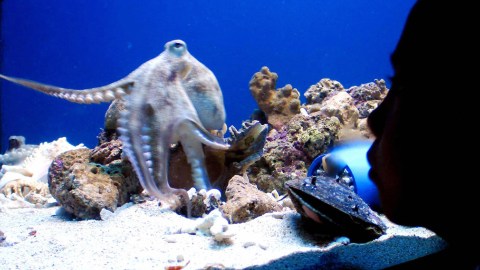Might Alien Life Evolve Like the Incredible Octopus?

Consider the octopus: a creepy skeleton-less creature with limbs that have regenerative properties and a mind of their own. Its structure — inside and out — makes it like no other animal on earth.
As a part of the Mollusca phylum, the octopus seems so far removed from its clam cousin. Neurobiologist Benny Hochner, from the Hebrew University of Jerusalem in Israel, talked about this oddity in an interview with Alison Abbott from Nature:
“Very simple molluscs like the clam — they just sit in the mud, filtering food. And then we have the magnificent octopus, which left its shell and developed the most-elaborate behaviors in water.”
Scientists have marveled at the octopus for years, and now they’ve taken the time to delve deeper into its biology by decoding its genome. It sequencing reveals an evolutionary track so different from man. Neurobiologist Clifton Ragsdale, from the University of Chicago in Illinois, jokingly described it as something out of this world:
“The octopus appears so utterly different from all other animals, even ones it’s related to, that the British zoologist Martin Wells famously called it an alien. In that sense, you could say our paper describes the first sequenced genome from an alien.”
Researchers from the University of Chicago; the University of California, Berkeley; the University of Heidelberg in Germany; and the Okinawa Institute of Science and Technology in Japan came together in this genome-wide analysis. Hochner expressed the importance of this genome project to Abbott:
“It’s important for us to know the genome, because it gives us insights into how the sophisticated cognitive skills of octopuses evolved.”
In their analysis, researchers found the octopus genome has a system, which allows it to change the function of certain proteins within its tissue. Abbott writes:
“Electrophysiologists had predicted that this could explain how octopuses adapt their neural-network properties to enable such extraordinary learning and memory capabilities.”
Its half a billion neurons, which spill out into its arms, connected without the use of long-range fibers, like the ones found in the spinal cords of invertebrates, allow the octopus’ arms to “have a mind of their own.” Each one with the power to execute a cognitive task, even when dismembered from its body. This natural design has left many in the field of soft robotics envious of its neural network.
The folks over at Nature have given us a more personal look at an octopus named “Scootie,” who lives at the University of Chicago. The video shows the octopus displaying its powers as a master of deception with color-changing membranes and cognitive prowess to learn. Though, knowing that this little guy has the same cognitive abilities as my dog makes me think twice about ordering it again at the sushi restaurant.
Read more about this genome-sequencing project at Nature.
Photo Credit: AFP / Getty Staff




